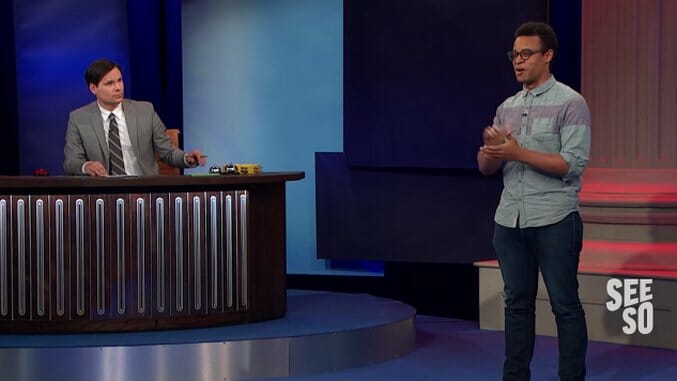Toss a bunch of standup comics in a TV studio and odds are you’ll come out the other side with either Undateable (r.i.p.) or some manner of competition. While improv and sketch emphasize groupthink and harmony, the standup has always been a solitary actor, positioned either against an audience or her fellow comics. Roasts, roast battles, game shows, Last Comic Standing—they all imagine jokes as weapons and joke-telling as an adversarial pursuit, a bid to win over the crowd, the judges, and ultimately one’s peers. It’s maybe a little weird, given that the point of a joke is to make a clump of humans feel the same emotion. When comedy becomes a matter of one-upmanship, comics are implicitly encouraged to make easy choices rather than risky ones (see: every Roast of Rob Lowejoke about Ann Coulter’s looks). But if we must gamify comedy to get more comedians on TV, well, so be it. Let the games begin.
Debate Wars, Seeso’s entry into the field of comedy competitions, carries the torch without a whiff of the mean-spiritedness of its many peers. The series, adapted from a live show at New York City’s Symphony Space, is whimsical to its core: each half-hour (roughly) episode pits two teams of two comics against each other in a debate of inconsequential subjects—cake versus pie, dogs versus cats, babies versus old people. The debates are moderated by Michael Ian Black, ostensibly the show’s star and the closest thing it has to a voice—a sort of silly dignity, the same sardonic gravitas that defined The Daily Show at the height of Jon Stewart’s captainship (these adjectives also describe Brian McCann, a longtime Conan writer who serves as show-runner for Debate Wars). It’s a sterling fit for Black, one of our few remaining comedian-slash-public intellectuals and easily the most entertaining part of Debate Wars. It’s not just the aristocratic poise with which he conducts each debate, the precise wit of his interjections, the deadpan glee he takes in calling out misbehaving debaters—no, the show’s most delightful moments are when Black breaks character, so clearly taken by whatever ludicrous attempt at rhetoric has transpired before him. Naturally a variety of comedians will bring a variety of strategies to the ancient art of debate, and the funnier attempts are usually the ones that favor whimsy over sincerity. UCB regular Connor Ratliff, who defends cats with a stunning (if, er, pitchy) rendition of the Cats ballad “Memory” while wearing cat makeup, is a standout; so is Todd Barry, who delivers one of the show’s finer PowerPoint presentations in his defense of “In Real Life” against the Internet.
“I didn’t know what people were going to say,” Black told Paste. “I wanted it to be a surprise, so my reactions were genuine.” His naiveté as a host is to the show’s immense benefit—not only because it allows for entertaining off-the-cuff interactions, but for the conduit he provides into the studio. Debate Wars was taped before a live audience whose reactions are often edited with a… heavy hand. Black’s wry chuckle, which occasionally descends into straight-up fits of giggles, offers a more welcoming stand-in for viewers at home. And there is indeed plenty to be surprised by in Debate Wars. The cast of debaters includes traditional observational comics, like Barry and Judah Friedlander, as well as more experimental artists, like Jo Firestone, Jenah Friedman, and Eugene Mirman. There are also improvisors like Ratliff (Black: “I thought he was a musical theatre performer!”) and UCB artistic director Shannon O’Neil, who team up for an excellent defense of Nurture against Nature. Contestants were responsible for crafting their own arguments; as is the case with Comedy Central’s roasts, though, a small team of writers was available for debaters in need. “There were people on both sides who were support,” explained Nancherla, a producer and writer for the show who previously worked with McCann on FX’s Totally Biased with W. Kamau Bell. “In case they didn’t have ideas, or needed facts. You could use as much or as little help as you needed.” (Black: “I know Aparna helps out people who are less talented or literate.”)
The medley of voices in each episode means that Debate Wars’ drier segments are usually revived pretty quickly. The format of the debates, however, is unbalanced, sometimes to a fault. Each team has two members: one makes the opening argument, the other makes a rebuttal and then a closing argument. (There’s an “interrogation round” in between, in which Black peppers each team with questions.) The opener thus spends most of the debate silent, occasionally butting in with quips or retorts. This asymmetry is easy to overlook in some episodes, but harder when that first debater is Ratliff (it really cannot be overstated how marvelous he is in this show), or when the favored contestant is Andy Dick (who, though he doesn’t even merit the parenthetical, opens with a joke asking whether he groped anyone backstage—“yet”—one of those dreadful attempts at self-awareness that rather betrays an utter lack thereof). Thankfully, this is one of Debate Wars’ few flaws. All told, the show is quintessential Seeso—weird but resonant, messy but deliciously so. Now, if only NBC would tap Black to host an actual debate…
Seth Simons is a Brooklyn-based writer, performer, and birdwatcher. Follow him @sasimons.
